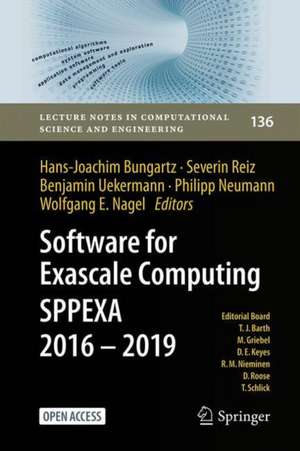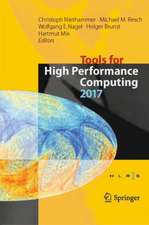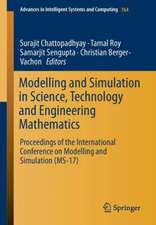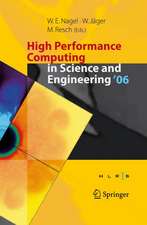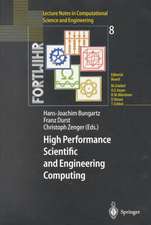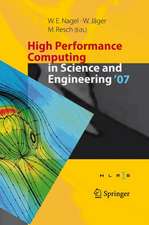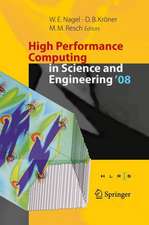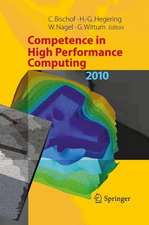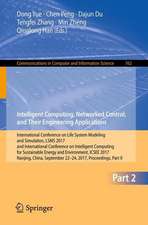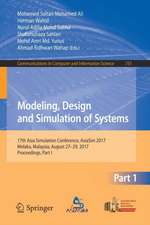Software for Exascale Computing - SPPEXA 2016-2019: Lecture Notes in Computational Science and Engineering, cartea 136
Editat de Hans-Joachim Bungartz, Severin Reiz, Benjamin Uekermann, Philipp Neumann, Wolfgang E. Nagelen Limba Engleză Hardback – 31 iul 2020
In that respect, it both represents a continuation of Vol. 113 in Springer’s series Lecture Notes in Computational Science and Engineering, the corresponding report of SPPEXA’s first funding phase, and provides an overview of SPPEXA’s contributions towards exascale computing in today's sumpercomputer technology. The individual chapters address one or more of the research directions (1) computational algorithms, (2) system software, (3) application software, (4) data management and exploration, (5) programming, and (6) software tools.
The book has an interdisciplinary appeal: scholars from computational sub-fields in computer science, mathematics, physics, or engineering will find itof particular interest.
| Toate formatele și edițiile | Preț | Express |
|---|---|---|
| Paperback (1) | 320.57 lei 6-8 săpt. | |
| Springer International Publishing – 18 sep 2020 | 320.57 lei 6-8 săpt. | |
| Hardback (1) | 384.12 lei 6-8 săpt. | |
| Springer International Publishing – 31 iul 2020 | 384.12 lei 6-8 săpt. |
Din seria Lecture Notes in Computational Science and Engineering
-
 Preț: 375.63 lei
Preț: 375.63 lei - 18%
 Preț: 1247.70 lei
Preț: 1247.70 lei - 18%
 Preț: 787.15 lei
Preț: 787.15 lei -
 Preț: 384.31 lei
Preț: 384.31 lei - 20%
 Preț: 990.95 lei
Preț: 990.95 lei - 15%
 Preț: 648.56 lei
Preț: 648.56 lei - 15%
 Preț: 653.00 lei
Preț: 653.00 lei -
 Preț: 405.28 lei
Preț: 405.28 lei - 18%
 Preț: 976.06 lei
Preț: 976.06 lei - 18%
 Preț: 968.82 lei
Preț: 968.82 lei -
 Preț: 397.97 lei
Preț: 397.97 lei - 18%
 Preț: 962.49 lei
Preț: 962.49 lei - 15%
 Preț: 647.08 lei
Preț: 647.08 lei - 15%
 Preț: 648.56 lei
Preț: 648.56 lei - 15%
 Preț: 649.54 lei
Preț: 649.54 lei - 18%
 Preț: 1389.30 lei
Preț: 1389.30 lei -
 Preț: 428.30 lei
Preț: 428.30 lei - 18%
 Preț: 1240.62 lei
Preț: 1240.62 lei - 20%
 Preț: 666.27 lei
Preț: 666.27 lei - 15%
 Preț: 654.43 lei
Preț: 654.43 lei - 15%
 Preț: 644.30 lei
Preț: 644.30 lei - 18%
 Preț: 957.62 lei
Preț: 957.62 lei - 18%
 Preț: 1224.18 lei
Preț: 1224.18 lei - 18%
 Preț: 904.11 lei
Preț: 904.11 lei - 18%
 Preț: 1242.83 lei
Preț: 1242.83 lei - 20%
 Preț: 992.11 lei
Preț: 992.11 lei - 15%
 Preț: 642.83 lei
Preț: 642.83 lei - 18%
 Preț: 954.45 lei
Preț: 954.45 lei - 18%
 Preț: 783.20 lei
Preț: 783.20 lei - 18%
 Preț: 949.42 lei
Preț: 949.42 lei - 15%
 Preț: 642.83 lei
Preț: 642.83 lei - 18%
 Preț: 964.86 lei
Preț: 964.86 lei - 18%
 Preț: 1260.83 lei
Preț: 1260.83 lei - 15%
 Preț: 650.37 lei
Preț: 650.37 lei
Preț: 384.12 lei
Preț vechi: 480.15 lei
-20% Nou
Puncte Express: 576
Preț estimativ în valută:
73.51€ • 76.46$ • 60.69£
73.51€ • 76.46$ • 60.69£
Carte tipărită la comandă
Livrare economică 14-28 aprilie
Preluare comenzi: 021 569.72.76
Specificații
ISBN-13: 9783030479558
ISBN-10: 3030479552
Pagini: 620
Ilustrații: XII, 620 p. 256 illus., 231 illus. in color.
Dimensiuni: 155 x 235 mm
Greutate: 1.06 kg
Ediția:1st ed. 2020
Editura: Springer International Publishing
Colecția Springer
Seria Lecture Notes in Computational Science and Engineering
Locul publicării:Cham, Switzerland
ISBN-10: 3030479552
Pagini: 620
Ilustrații: XII, 620 p. 256 illus., 231 illus. in color.
Dimensiuni: 155 x 235 mm
Greutate: 1.06 kg
Ediția:1st ed. 2020
Editura: Springer International Publishing
Colecția Springer
Seria Lecture Notes in Computational Science and Engineering
Locul publicării:Cham, Switzerland
Cuprins
EXA-DUNE: Flexible PDE Solvers, Numerical Methods, and Applications.- Smart-DASH: Smart Data Structures and Algorithms with Support for Hierarchical Locality.- Terra-Neo: Integrated Co-Design of an Exascale Earth Mantle Modeling Framework.- EXASTEEL-2: Dual Phase Steels - from Micro to Macro Properties.- GROMEX: Unified Long-range Electrostatics and Dynamic Protonation for Realistic Biomolecular Simulations on the Exascale.- ExaStencils: Advanced Stencil-Code Engineering.- ExaFSA: Exascale Simulation of Fluid-Structure-Acoustics Interactions.- EXAHD: An Exa-Scalable Two-Level Sparse Grid Approach for Higher-Dimensional Problems in Plasma Physics and Beyond.- EXAMAG: Exascale Simulations of the Magnetic Universe.- FFMK: A Fast and Fault Tolerant Microkernel-based System for Exascale Computing.- ESSEX-II: Equipping Sparse Solvers for Exascale.- EXASOLVERS: Extreme Scale Solvers for Coupled Problems.- ADA-FS: Advanced Data Placement via Ad-hoc File Systems at Extreme Scales.- AIMES: Advanced Computation and I/O Methods for Earth-System Simulations. ExaDG: High-Order Discontinuous Galerkin for the Exa-Scale. MYX-MUST Correctness Checking for YML and XMP Programs.- ExtraPeak: Automatic Performance Modeling of HPC Applications with Multiple Model Parameters.
Textul de pe ultima copertă
This open access book summarizes the research done and results obtained in the second funding phase of the Priority Program 1648 "Software for Exascale Computing" (SPPEXA) of the German Research Foundation (DFG) presented at the SPPEXA Symposium in Dresden during October 21-23, 2019.
In that respect, it both represents a continuation of Vol. 113 in Springer’s series Lecture Notes in Computational Science and Engineering, the corresponding report of SPPEXA’s first funding phase, and provides an overview of SPPEXA’s contributions towards exascale computing in today's sumpercomputer technology. The individual chapters address one or more of the research directions (1) computational algorithms, (2) system software, (3) application software, (4) data management and exploration, (5) programming, and (6) software tools.
The book has an interdisciplinary appeal: scholars from computational sub-fields in computer science, mathematics, physics, or engineering will find itof particular interest.
In that respect, it both represents a continuation of Vol. 113 in Springer’s series Lecture Notes in Computational Science and Engineering, the corresponding report of SPPEXA’s first funding phase, and provides an overview of SPPEXA’s contributions towards exascale computing in today's sumpercomputer technology. The individual chapters address one or more of the research directions (1) computational algorithms, (2) system software, (3) application software, (4) data management and exploration, (5) programming, and (6) software tools.
The book has an interdisciplinary appeal: scholars from computational sub-fields in computer science, mathematics, physics, or engineering will find itof particular interest.
